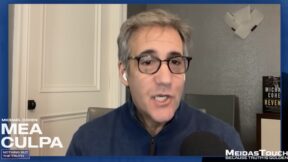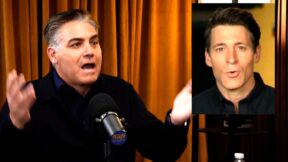Maggie Haberman Paints Nightmare Scenario For ALL Trump Trials: ‘There Are Many Many’ Insiders Who Can Flip
New York Times correspondent and CNN analyst Maggie Haberman painted a nightmare scenario for President Donald Trump, pointing out there are “many many” insiders who can flip on him the way Brian Butler did.
CNN anchor Kaitlan Collins scored an exclusive interview with the former Trump staffer known in the Mar-a-Lago indictment as “Trump Employee 5” — now revealed to be Butler, a 20-year employee of Trump.
Butler — a key witness in the documents case — revealed his unwitting part in moving boxes of documents for Trump and his distaste for his now-former boss.
On Wednesday night’s edition of CNN’s The Source with Kaitlan Collins, Collins interviewed Haberman about several of Trump’s cases and other issues, and played some footage of Butler’s interview.
Collins and Haberman agreed Butler will be a very damaging witness at trial, and that he illustrates the fact that there is a parade of insiders like him that can damage Trump in all of his trials:
COLLINS: I mean, if this goes to trial, he is a central witness in all of this.
HABERMAN: He’s a central witness. He’s describing a scenario, where the former President put a lot of his employees, not just people, who worked at Mar-a-Lago, but people who worked for him in his post- presidential life, as direct aides, in a dangerous situation, because they are handling boxes that had classified material.
Brian Butler, as far as I know, does not have a security clearance. And so, a lot of people were around these documents, who don’t have security clearances. That’s–
COLLINS: Yes. He was running the car service at Mar-a-Lago.
HABERMAN: Exactly. I mean, that’s not — that’s not their fault. That’s the material that was taken by the former President. And they are then in this moment of jeopardy.
What strikes me about what he’s saying, and to your point about him being a key witness, there are many, many Brian Butlers.
There are many people, who worked for Trump, whether it was in the White House, whether it was on the campaign, whether it was at Mar-a- Lago, who, whether it was in the documents trial, or the federal January 6 trial, who will testify, and it will just not be a good fact set for him.
So, as much as he is going to try to take control of the narrative, outside the courtroom, where there won’t be cameras, in any of these trials, there will still be a lot of testimony that gets heard that is just not going to be helpful, to him.
COLLINS: I think that’s a really good point, because we’ve seen these one-off instances, where someone who is close to him, turns on him, or they legally cooperate against him, because they were placed in situations–
HABERMAN: Sure.
COLLINS: –where in the middle of it.
But this would be two situations, in these two cases, where it would be a stream of the closest people around him, and documents. It would be everyone who’s worked at Mar-a-Lago, from cooks to people running the car service, to body-men.
In January 6, the case in D.C., it’s everyone, who worked in his cabinet, in his administration.
HABERMAN: And it’s not actually that different, the type of circumstance that we’re talking about, the specifics of it is, in terms of the Alvin Bragg trial, which is the one that’s starting in less than two weeks. The central witness there is Michael Cohen, Trump’s former fixer and lawyer. And that is a narrower case with fewer witnesses. It’s really pretty dependent on Cohen.
But there is documented evidence. There are, you know, there are emails, there is written correspondence, there are financial records that are going to be part of that record.
It’s the same basic idea. It’s somebody, who was in a situation, where they said they were doing something for Trump, or Trump wanted them to do something. And you just see that on a much bigger level, with the January 6 or documents case.
COLLINS: Yes. And you just — you also see, he’s tried to kind of learn his lesson, I guess you would say. Michael Cohen always says, having him keep people in the fold, and pay for their attorneys.
They’ve tried to do that at Mar-a-Lago, but they haven’t been successful. I mean, Brian Butler, they–
HABERMAN: Yes.
COLLINS: –they tried to pay for his attorney.
HABERMAN: Right.
COLLINS: And he was like, no, I’m going to get my own.
HABERMAN: Yes. In fact, they tried to reach out to him to get him an attorney, and he didn’t return the phone call, from the Trump lawyer, who reached out to him. You’re absolutely right, that there was a pattern that they observed.
There, I think, are other complicating factors, in some of these cases. But the end result has been trying to keep people in the tent. And it does not always work.
COLLINS: Are you surprised that Trump hasn’t said anything about that interview, those comments? He talks about E. Jean Carroll, every five minutes, calls her Miss Bergdorf Goodman. He hasn’t said anything about Brian Butler. I don’t know if it’s because of his release conditions that he’s not supposed to talk about the witnesses here.
HABERMAN: I think that a lot of it is about not talking about witnesses, in a particular federal case, because there has been so much concern, from the government, about witness intimidation, in that case.
In the E. Jean Carroll case, he did go many, many weeks without doing it. When he started doing it again, it was right after he posted that bond. And I don’t think those two are unrelated. Now, you could make the argument he’s posted the bond, it’s over. He’s certainly not helping himself with his appeal, by doing that.
COLLINS: Well, and you would think he would learn his lesson on that since it’s costing him.
HABERMAN: I think some of these lessons, like filing lawsuits that he ends up paying the other side’s legal fees for, he has to learn several times.
Watch above via CNN’s The Source with Kaitlan Collins.





Comments
↓ Scroll down for comments ↓